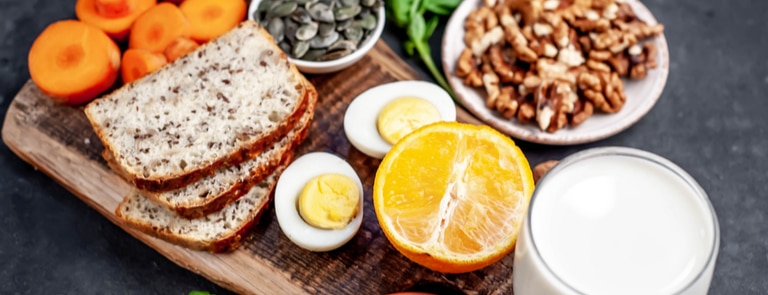15% off €25
Your guide to thiamine

Have you come across thiamine in an article, on TV or has somebody mentioned it to you and you are now wondering what it is?
Thiamine is a vitamin that does a lot of fundamental good within the human body. While it may not be as commonly known or talked about as the likes of Vitamins C or D, it’s extremely important when it comes to making sure various different elements of our bodies, our brain included, function as they’re supposed to. It also helps keep us healthy overall.
What is thiamine?
Thiamine is another name for Vitamin B1. It’s essentially one of the B vitamins and is present in many different types of food.1
It’s also referred to as thiamin, and is available on prescription. It’s usually provided as standard-release or slow-release thiamine tablets. It can also be given as an injection for people with a severe Vitamin B deficiency.2
Various different types of supplements are available. There are supplements that just contain thiamine, Vitamin B complex and multivitamin tablets that contain thiamine, as well as other minerals and vitamins.
What does thiamine do to your body?
Thiamine helps to turn the food we eat (carbohydrates) into energy that’s needed to help keep our brain and nervous system functioning and healthy. It also plays a key role in muscle contraction and activating nerve signals.4
It isn’t something our bodies naturally make, which is why it’s important we eat thiamine-rich food. However, it is possible to get all the thiamin you need from your diet alone.4
Thiamine food sources
- Beef
- Liver
- Dried milk
- Nuts
- Oats
- Oranges
- Pork
- Eggs
- Seeds
- Legumes
- Peas
- Yeast
- Vitamin B1-fortified foods, such as rice, pasta, breads, cereals and flour5
If you don’t have enough Vitamin B1 in your system then you may feel tired, lose your appetite and your muscles may ache.6
Summary
Thimaine is actually Vitamin B1. It’s essential for fuelling our bodies and making sure your brain and nervous system is healthy. You can get all the thiamin you need from food.
What are the benefits of thiamine?
-
Heart health
Vitamin B1 is one of the main things that contribute to the normal functioning of the heart, in fact, it’s vital. Being deficient in thiamine can cause congestive heart failure.7 In a review of 20 clinical studies, supplementation with thiamine improved cardiac function in people with heart failure.8
-
Good metabolism
Our bodies need Vitamin B1 to make ATP, the body’s main energy-carrying molecule. Thiamine helps convert carbs into glucose, which our bodies need to keep our metabolism running smoothly. It also helps break down proteins and fats.9
-
Strong immunity
As is the case with other B-complex vitamins, Vitamin B1 is sometimes called an ‘anti-stress’ vitamin because it may strengthen the immune system and improve the body’s ability to cope with stressful conditions.
-
Brain health
Thiamine appears to help with the development of the layer in the brain that protects the nerves from damage and death. It’s also used by our brain nerve cells and other supporting cells within the nervous system. Read our article on why B vits = a healthy brain.
-
Good digestion
Thiamine is also necessary for a healthy digestive system. It helps regulate the production of hydrochloric acid, which is key for maintaining proper digestive function.
-
Healthy eyesight
Research has found thiamin may reduce the risk of developing cataracts. Studies have revealed that people who consume plenty of protein along with Vitamins A, B1, B2, and B3 in are less likely to develop cataracts.
Summary
Thiamin’s responsible for doing a lot of fundamental and essential work within the body, from helping make sure your hearts work properly, to keeping our metabolism going and coping with stress.
What are the symptoms of low thiamine?
There are several tell-tale symptoms of not having enough thiamine in your body. They include:10
- Feeling exhausted or struggling to remember things - thiamine deficiency can make you feel fatigued because your body needs thiamine to generate energy. As for poor memory, thiamine’s required for various enzymes that play a vital part in glucose metabolism within the brain and help it function properly.
- Having weak muscles or losing weight - when we don’t have enough thiamine, our metabolism of glucose is affected (as mentioned above). This can also lead to muscle weakness and potential weight loss because our bodies aren’t getting the fuel they need to function properly.
- Not feeling hungry – thiamine affects the brain’s hypothalamus, a gland that controls appetite and hunger. If thiamine levels are low, the brain thinks it’s full, making you lose your appetite.
If your GP suspects you are low in thiamine, you’ll be asked to take a urine or blood test to check your levels. Because our bodies can only store limited amounts of thiamine at any one time, deficiencies can develop relatively quickly, within 10 days.11
Summary
Some of the signs of low thiamine can be mistaken for other health conditions. Common symptoms include feeling exhausted, poor memory, weak muscles and loss of appetite.
Thiamine dosing
How much thiamine is safe to take?
The vast majority of adults and children, aged 12 years or older, can take thiamine. It should only be given to children under the age of 12, if advised by a medical professional.12
Thiamin dosage is determined on how deficient you are in Vitamin B1.
- Mild thiamine deficiencies – the usual dose for adults is between 25mg and 100mg, taken once a day, with or without food
- Severe thiamine deficiencies – the usual dose for adults is 100mg, taken 2 or 3 times a day, with or without food
If children under 12 are prescribed thiamine, their dosage will be calculated based on how much they weigh.13
If you are taking thiamine to treat Vitamin B1 deficiency, your dose will remain the same until your B1 levels have increased and any symptoms have subsided. Your GP may prescribe you a lower dose of thiamine at this point to help prevent you from becoming deficient again.
Thiamine side effects and risks
What are the side effects of taking thiamine?
As is the case with all medicines, thiamine can cause side effects in some people. However, most people experience no side effects or only minor ones.14,15
Mild side effects include:
- Diarrhoea
- Sweating
- Restlessness
- Itching
- Stomach ache
- Weakness
- Nausea
More severe side effects include:
- Severe allergic reaction (anaphylaxis)
- Throat tightness
- Fluid in the lungs (pulmonary edema)
- Rapid swelling of the skin
How to cope with some of the side effects
The NHS has published some practical guidance to help people deal with three of the more mild symptoms - nausea, diarrhoea and stomach ache.16
- Nausea – you should take your thiamine with, or just after, a meal or snack. It may also help to avoid eating rich or spicy food.
- Diarrhoea – drink plenty of water to avoid dehydration.
- Stomach ache – take your thiamine with, or just after a meal or snack. Some gentle movement or exercise may help any pain. Applying warmth to your stomach (e.g. a heat pad or hot water bottle) may also help.
If the symptoms do not improve after a couple of days or get worse, you should speak to your GP.
What are the risks associated with taking thamin?
You should not use thiamine if you are allergic to it. You should speak to your GP first before taking thamin supplements, particularly if you:
- Have any medical conditions
- Are taking any medications or herbal products
- Are allergic to certain medication or food
Pregnant and breastfeeding women
If you are already taking thiamine and become pregnant, your dose may need to be altered. You should not take thiamine without medical advice if you are pregnant or plan to become pregnant.17
It’s not known whether thiamine passes into breast milk. Therefore breastfeeding women may need to alter their dose and should not take thiamine unless they’ve spoken to their GP.
Summary
Thiamine doses depend on how deficient you are in thiamin. The side effects of taking it tend to be mild and the dose is usually adjusted once you are no longer deficient. However, you may need to continue to take a small dose to avoid becoming deficient again.
A final few words about thiamine…
Many of us may not be familiar with the name, but all of us can benefit from the work that thiamine does in our bodies.
Thiamine’s one of those vitamins that we can get enough of from our diet, but it’s not stored in large amounts in our body, so it’s important to eat thiamin-rich (Vitamin B) foods every day to keep those levels topped up. For more insight on Vitamin B, check out this article, ‘What’s the best Vitamin B to take?
Last updated: 10 May 2021
What's the best Vitamin B to take?
The Vitamin B family is made up of 8 individual vitamins, so which is the best one to take? This article will help you decide.


- https://www.livescience.com/51721-vitamin-b1-thiamine.html
- https://www.nhs.uk/medicines/thiamine-vitamin-b1/
- https://medlineplus.gov/ency/article/002401.htm
- https://www.nhs.uk/medicines/thiamine-vitamin-b1/
- https://www.livescience.com/51721-vitamin-b1-thiamine.html
- https://www.nhs.uk/medicines/thiamine-vitamin-b1/
- https://selfhacked.com/blog/thiamine/
- https://selfhacked.com/blog/thiamine/
- https://selfhacked.com/blog/thiamine/
- https://www.thehealthy.com/nutrition/silent-signs-thiamine-deficiency/
- https://www.thehealthy.com/nutrition/silent-signs-thiamine-deficiency/
- https://www.nhs.uk/medicines/thiamine-vitamin-b1/
- https://www.nhs.uk/medicines/thiamine-vitamin-b1/
- https://www.rxlist.com/consumer_thiamine_vitamin_b1/drugs-condition.htm
- https://www.nhs.uk/medicines/thiamine-vitamin-b1/
- https://www.nhs.uk/medicines/thiamine-vitamin-b1/
- https://www.everydayhealth.com/drugs/thiamine-vitamin-b1/



